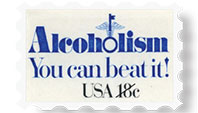
Who would have thought a square-inch piece of postage could inspire so much hostility? But last month, when the United States Postal Service released 100 million stamps based on Harry Potter, philatelists were furious at the idea that a “foreigner” would certify a U.S. letter and accused agency officials of being “blatantly commercial” by cashing in on the best-selling series. It’s not the only time stamps have stirred such patriotic passions.

1981: Alcoholism: You Can Beat It!
Objection: Letter recipients took its message personally.
Critics felt the USPS was turning armchair physician with this set, intended to spread the message that alcoholism is treatable. The stamp—a caduceus, the word alcoholism, and the line “You can beat it!”—offended letter readers of all sobriety levels, the USPS admitted: They “apparently … felt that putting that stamp on a letter was suggesting to the person receiving it that he has a drinking problem.”

1993:
Legends of American Music: Elvis Presley
Objection: The King is an “inarticulate slug.”
With over 700 million sold, the Elvis series remains the Postal Service’s top seller, yet opponents filled the USPS mailroom with “Just say no” letters. “It’s impossible,” wrote the Washington Post’s Richard Cohen, “to separate Elvis Presley the musical artist from Elvis Presley the inarticulate slug at life’s bottom.” Anyway, he’s ineligible, others objected; per USPS regulations, stamp honorees must not still be alive.

1995:
50th Anniversary of WWII
Objection: Depicting atom bombs is in poor taste.
“Heartless” is how the mayor of Nagasaki described this commemorative stamp, which included the caption “Atomic bombs hasten war’s end.” When pressure mounted, the USPS scrapped the exploding A-bomb for President Truman, a figure conveniently being invoked, a second wave of critics pointed out, by the embattled Clinton White House.

1999:
Jackson Pollock
Objection: Editing out his cigarette whitewashes history.
Critics cried foul at the cigarette gone conspicuously missing from Pollock’s mouth in this image based on a well-known 1949 Life-magazine photograph of him painting in his studio. The stamp’s release came on the heels of the 1998 multibillion-dollar Big Tobacco lawsuit, and critics rejected the cig’s absence as “trying to sanitize American history.”

2001:
Frida Kahlo
Objection: Kahlo was a Stalinist.
In the midst of a mild Frida-mania—a feature-length film, an opera, Volvo ads—critics drew the line at her unibrowed face on their mail. “Visas are denied to artists with Frida Kahlo’s politics,” said the writer Whitney Chadwick, arguing that celebrating the drug-using, bisexual, Hispanic artist (whose paintings include Stalin and I) was “like hitting for the p.c. cycle.”

2009:
The Simpsons
Objection: There are subjects more deserving than an animated sitcom.
Denounced as money-grubbing by some, this series also got a vocal detractor on the Hill: Congressman Mike Honda, who said, “I question the direction USPS is headed when it pays homage to Homer Simpson over the sacrifice of our venerable Nisei veterans”—that is, Japanese-American war veterans, like his father. One billion were printed but less than a third sold, moving the USPS to create the “Forever” stamp.

2013:
Just Move!
Objection: Stamps depicted dangerous activities.
This series, based on Michelle Obama’s Let’s Move campaign, showed kids being physically active. The White House rejected three of the fifteen as “unsafe”; in these, juvenile daredevils were busy cannonballing (“Swim”), performing helmetless headstands (“Stand”), and skateboarding without kneepads (“Ride”). (No mention of the girl on a slippery rock in “Stretch.”) The whole project was scuttled.
Have good intel? Send tips to intel@nymag.com.